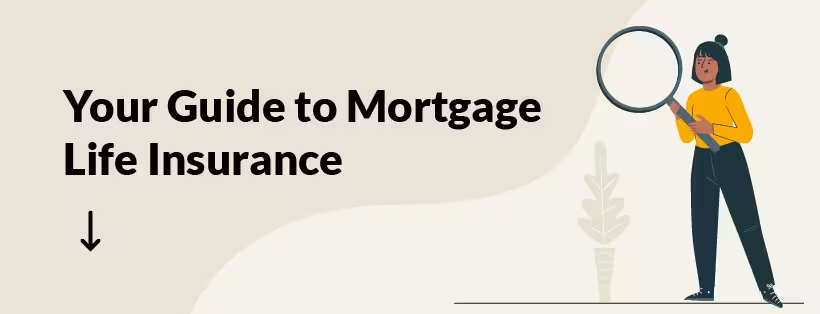Mortgage life insurance
Your mortgage is often your biggest financial commitment, so it’s important to protect it. This guide explores how mortgage life insurance can clear your mortgage if you pass away and secure your home for your loved ones.
Mortgage life insurance explained
If you have loved ones who depend on you financially, mortgage life insurance could help protect them if you pass away. It acts as a safety net by paying off the outstanding mortgage balance if the worst happens, so your family won’t lose their home.
In summary, mortgage life insurance (also called decreasing term life insurance or mortgage protection):
- Pays out a lump sum to cover your mortgage if you die.
- Is aimed at those with a repayment mortgage, not an interest-only mortgage.
- Pays out a reducing amount over time, roughly keeping pace with your outstanding mortgage balance.
- Is normally cheaper than other types of life insurance, like level term insurance.
- Only clears the outstanding mortgage balance, so might fall short if your dependants would need extra money for other living costs.
- Isn’t a legal requirement, though some lenders might make it a condition of your loan.
- Doesn’t have to be taken out with your mortgage provider – you can shop around for the best deal.

Mortgage life insurance is a life insurance policy that’s designed to pay off your mortgage if you die during its term. Also called decreasing term life insurance, it’s aimed at those with a repayment mortgage rather than an interest-only mortgage. The payout reduces over time roughly in line with your mortgage.
If you survive for the term of your policy, there’s no payout. The policy simply ends.
If you die while the policy is active, mortgage protection will pay out a lump sum that should clear the mortgage. So having this financial protection means your family won’t need to worry about keeping their home if the worst happens.
It’s important to know that the lump sum will only cover the remaining balance of the mortgage. If your loved ones depend on you for more than this financially, mortgage life insurance may not be the best option.
How does mortgage life insurance work?
With a repayment mortgage, some of the money you pay goes to the interest and the rest goes to the capital (the amount you’ve borrowed). This means the outstanding amount that you owe reduces over the years as you gradually pay it off. The payment from a mortgage life insurance policy reduces at around the same rate, which is why it’s called a decreasing term policy.
Because the payout gets lower over time, the amount you pay for the cover is generally cheaper than the premiums for other life policies, like level term life insurance.
What is level term life insurance?
Level term life insurance is another type of life cover that can also be used to pay off a mortgage if the policyholder dies during the term. It’s usually more expensive than mortgage life insurance as the payout doesn’t reduce over time and can cover more than just the cost of the mortgage.
A level term life insurance policy pays out the same lump sum no matter whether a claim is made in year two or year 20 - it doesn’t reduce. This is a better option if your loved ones would need extra financial help to pay for things like living costs or school fees as well as the mortgage.
If you have an interest-only mortgage, level term insurance is more suitable than mortgage life insurance. This is because you’re not paying off the capital over the years and your outstanding loan balance stays the same rather than reducing.
The table below compares the main features of mortgage life insurance with level term life insurance:
Everyone’s circumstances are different. But as a general rule, if your loved ones rely on you to pay the mortgage, life insurance makes sense – whether you choose mortgage life insurance or another option for financial protection.
With the average UK mortgage payment sitting at a hefty £1,428 a month, it’s often people’s biggest regular expense. However, only 35% of people in the UK hold any kind of life policy at all, despite 60% of people thinking they’d benefit from having some. If you don’t have life insurance and you die, your family could lose their home if they can’t afford to carry on making the mortgage repayments.
When you’re deciding if mortgage protection is right for you, consider things like how big your mortgage is, how old your children are, if you have any debts and if another adult in the household contributes financially.
Other things to think about:
- You might already have some cover through your employer, known as death in service benefit, so check that first and decide if you need additional cover. Keep in mind that you can have more than one life insurance policy.
- If you’re taking out a new mortgage and you already have a life insurance policy, it’s a good time to make sure it still meets your needs. You might not need a mortgage life insurance policy as well.
- If you don’t have any dependants, and you don’t have anyone you want to leave money to, life insurance isn’t necessary.
The cost of mortgage protection depends on your circumstances and how much cover you need. For example, you’ll pay a higher monthly premium to cover a larger mortgage. And factors like your health, medical history, age and lifestyle will all be taken into consideration when setting your premiums.
According to figures from Moneyfacts the average mortgage protection monthly premium for a 30-year-old non-smoker is around 23% lower compared with level term insurance and around 35% lower for an equivalent non-smoker (based on £100,000 sum assured over 25 years).
It's always worth getting mortgage life insurance quotes from different insurance providers so that you can find the best financial protection at the most competitive price.
Everyone’s circumstances are different, so the life insurance cover you need will depend on your particular situation. It’s worth taking some time to make sure you get the right level of cover for you.
As a general rule, the policy should match the term and amount of your mortgage, and decrease at the same rate. This makes sure you’re always covered for the sum of money you need to pay off the mortgage.
You can learn more about how long you should get life insurance for in our guide.
What happens when your circumstances change?
Things are likely to change over time and the insurance you have may not still be suitable for you. You might buy a bigger home, downsize, remortgage, divorce or have children. Each time something like this happens, remember to review your mortgage life cover to check it fits your new circumstances.
It’s important to make sure:
- You’re covered for the amount you need to pay off the balance of your mortgage.
- The length of the policy matches your mortgage term.
- You’re paying the right amount for your premiums – not too much nor too little.
- Mortgage life insurance is still the right type of cover for you.
Should you choose a joint life mortgage policy?
Whether joint cover is the right life insurance option for you will depend on your needs. A joint mortgage life policy is usually a bit cheaper than a single one. But if you pick joint life insurance, you need to know that it will only pay out once, even if both policyholders die at the same time.
Where can you get mortgage life insurance?
The first thing to note is that you don’t need to get it from your mortgage lender, though they’ll often offer it to you. Prices can vary a lot, so it’s best to shop around to get the best deal and cover for your needs. It can be beneficial to use a comparison site to compare mortgage life insurance quotes or go through a life insurance broker.
You can also check out our guide to the best life insurance providers in the UK.
When you’re buying a new home, it’s a good time to take stock and make sure you’re covered for other eventualities that could prevent you from being able to pay your mortgage. You should consider whether you need these types of cover:
- Critical illness cover - this pays a tax-free lump sum if you’re diagnosed with certain serious illnesses, and people often have it in addition to other life insurance policies. You can add critical illness cover to your mortgage life insurance or buy a separate policy.
- Income protection - this pays you a regular income if you can’t work for a time because of illness or injury, which would allow you to make your mortgage payments.
Are there alternative types of life cover to mortgage protection?
Yes, and you may want to consider other types of life policy when you’re deciding what’s best for you. You could choose level term life insurance, family income benefit or whole of life insurance. Each life insurance works slightly differently so make sure that you understand how they could protect your mortgage. For example, family income benefit provides a monthly income rather than a lump sum payment that could help with the monthly payments on your mortgage.
You can read more about the different types of life insurance in our guide.
What’s mortgage payment protection insurance (MPPI)?
This is a different type of insurance to mortgage life insurance. Instead of paying out a lump sum if you die, MPPI covers your monthly mortgage payments if you can’t work for a while. You can choose what you want to insure against - like having an accident, becoming ill or being made unemployed through no fault of your own.













